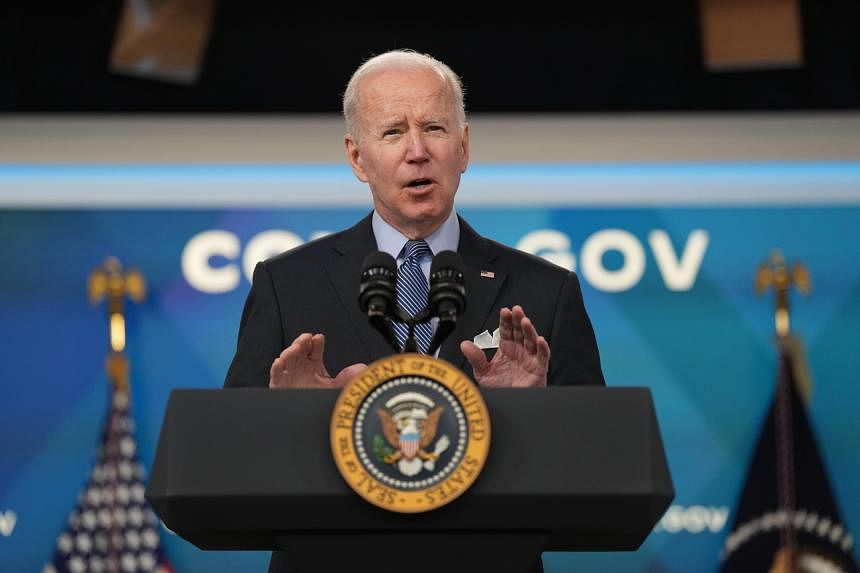WASHINGTON (NYTIMES) - US President Joe Biden stepped up the pressure on Congress to approve billions of dollars in emergency coronavirus relief aid, using a speech at the White House on Wednesday (March 30) to warn that US progress against Covid-19 would be at severe risk if Congress fails to act right away.
"This isn't partisan. It's medicine," Mr Biden declared.
At the end of his remarks, the president, 79, rolled up his sleeve to get his second Pfizer-BioNTech booster shot.
That followed a recent move by federal health officials to clear additional boosters of the Pfizer and Moderna vaccines for Americans older than 50 and many immunocompromised people, four months after their first booster.
Mr Biden also highlighted a new one-stop-shopping coronavirus website, covid.gov, aimed at helping Americans navigate access to testing, treatment, vaccines and masks, and to assess the risk of Covid-19 in their neighbourhoods. The site went live Wednesday morning.
The website, and Mr Biden's speech, are part of a broader effort to ease the nation out of pandemic crisis mode and usher in what experts are calling the "next normal" - a phase in which Americans will learn to live with the risk of Covid-19 and to adjust behaviour like mask wearing based on whether cases and hospitalisations are rising or falling.
Mr Biden's speech Wednesday was his first dedicated to Covid since before his State of the Union address March 1.
That strategy depends on the availability of vaccines and therapeutics, though, and the administration says it is out of money for both.
The White House has been pleading with Republicans in Congress to approve US$22.5 billion (S$30.43 billion) in emergency aid to purchase new vaccines and therapeutics, and to reimburse doctors who care for uninsured Covid-19 patients.
The federal government said recently that a fund established to reimburse doctors was no longer accepting those claims for testing and treatment "due to lack of sufficient funds."
On Capitol Hill, lawmakers said they hoped that a deal could be struck before Congress leaves next week for a two-week April recess, with private talks continuing Wednesday.
If a deal can be struck, it will likely be US$15.6 billion, matching the size of the smaller package that Democrats abruptly removed from a catchall spending package earlier this month when rank-and-file lawmakers objected to clawing back state aid to help pay for the deal.
It still remains unclear how the package will be paid for - a crucial Republican demand that has delayed passage.
"It's totally up to Democrats," said Senator John Thune of South Dakota, the No. 2 Republican. "This can get done, but it's in their court, and it just requires them to be willing to repurpose some existing funds, which they're reluctant to do."
Senator Mitt Romney, who has been leading talks with Senator Chuck Schumer, the majority leader, emerged from an afternoon meeting with Mr Schumer and other top lawmakers, and said that the two parties had exchanged lists of possible funds to repurpose but had yet to reach agreement.
"There's a gap between where we would go and where they would go," Mr Romney told reporters on Capitol Hill.
Speaking on the Senate floor ahead of the meeting, Mr Schumer warned that "the consequences of not getting Covid funding are really serious - scary, almost."
"We are not yet at the finish line, but we will keep working throughout the day, and I am committed to working with the other side reasonably and in good faith," he said.
While new coronavirus cases have been falling in the United States, a highly transmissible Omicron subvariant known as BA.2 has driven a surge in cases in Europe, and many experts expect that the United States may soon see the same.
Should that occur, it will be the first major test of the country's new strategy of living with the virus while limiting its impact.
Around the country, state and local governments have relaxed restrictions like mask and vaccine mandates.
White House and federal health officials have been making the case for weeks that Americans now have the tools - testing infrastructure, masks and other mitigation strategies, and drugs and vaccines - to live with the threat of the virus.
In his State of the Union address, Mr Biden announced a new "test to treat" initiative - a network of pharmacies and other sites where people can be tested for the coronavirus and then receive antiviral drugs if they test positive.
More than 2,000 sites are participating, the White House said. The covid.gov website features a "test-to-treat" locator tool to help people find participating locations.











